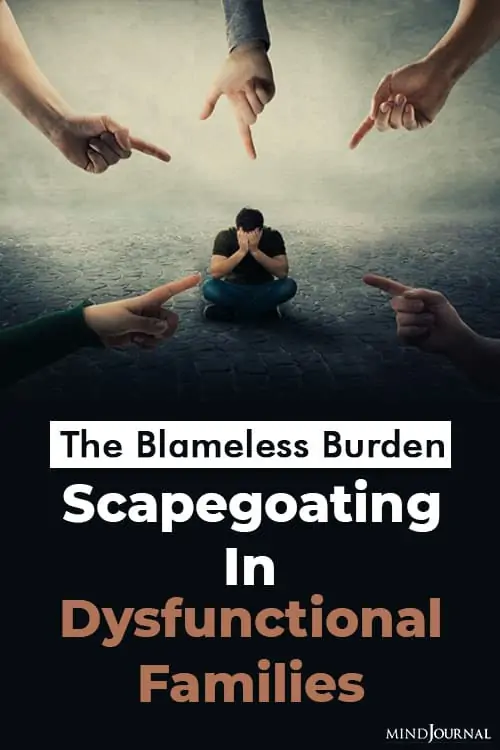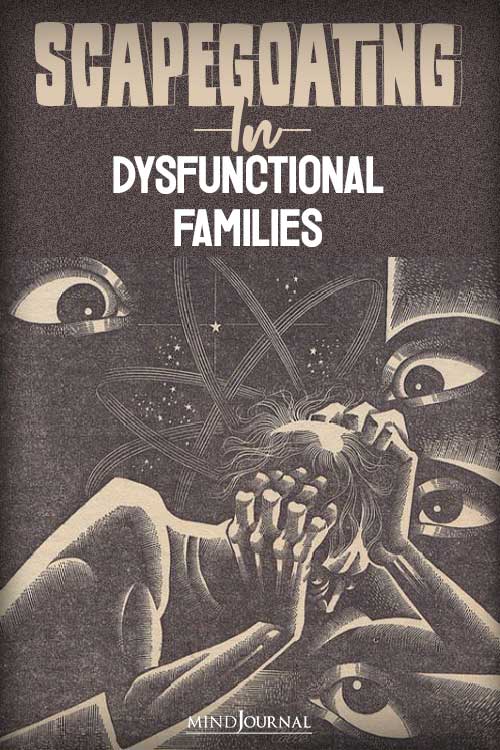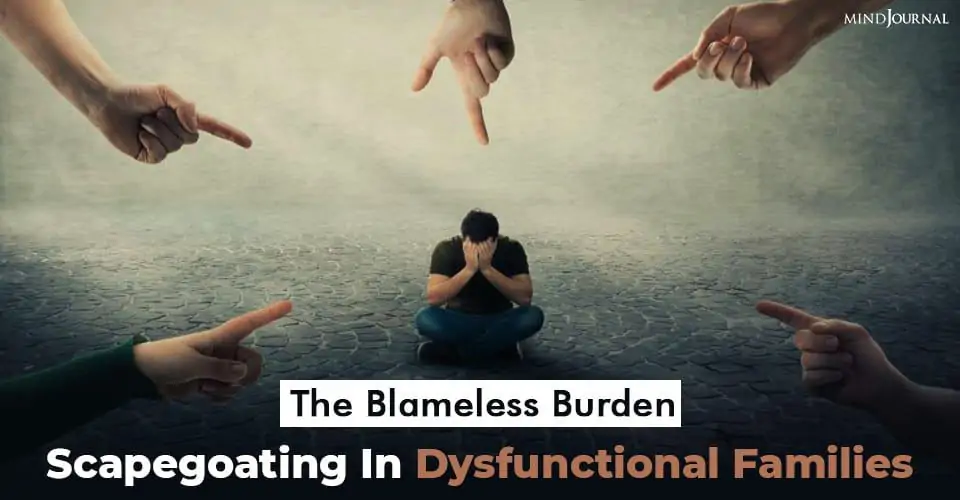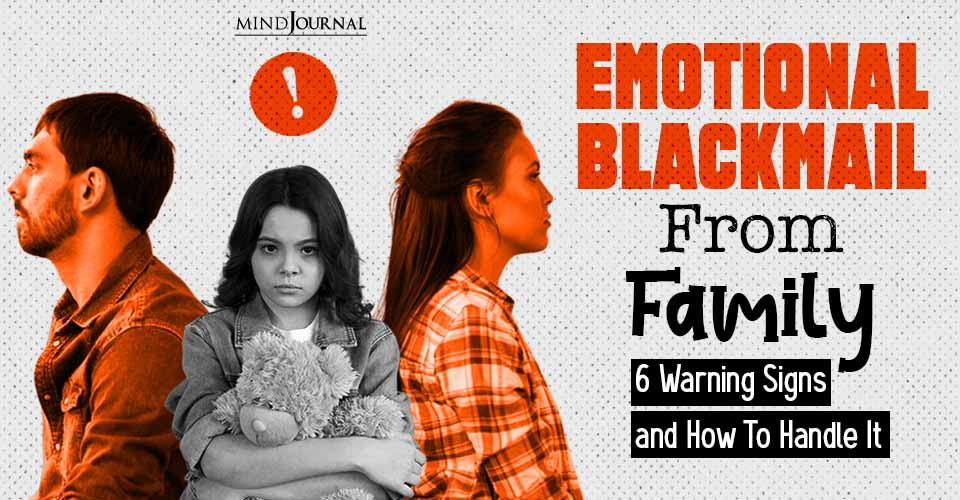Are you a victim of scapegoating in dysfunctional families? Within dysfunctional families, it may fall to one person—often the strongest and healthiest—to shoulder the burdens of the group in the cruel role of scapegoat, and this is why family scapegoats become lifelong victims.
In biblical lore, Aaron selected a goat on behalf of the entire tribe, cast upon it the sins of all members, and then banished it alone to the wild. The members of the tribe were then at great ease, having been freed from their cast-off sins—whatever those sins may have been.
Everyone felt better, though they had neither identified their specific sins nor atoned for them. They had simply agreed to hang them on the goat. If this spurious logic was obvious to anyone, it was not discussed. Why question an agreed-upon means of making everyone feel better?
Now about that goat. It was selected from the herd and sent forth into the wilderness for reasons having to do with the sins of others. The goat had done nothing to merit banishment. But once the ashes were cold on the rituals of dispatching it, the goat found itself alone in the wilderness, isolated from its herd, in unknown territory, suddenly forced to fend for itself. It faced dangers from predators; difficulty finding food, sustenance, and shelter; and it lived the constantly woeful insecurity of a herd animal without a herd.
This is the story of the scapegoat.
In dysfunctional families, for reasons similar to those Aaron devised, there can also be a designated person selected for the role of scapegoat.
Read The 5 Child Roles In Dysfunctional Families
In a family system, the selection process is less overt than Aaron’s. It is done more by consensual and habitual shunning that becomes an unspoken code of behavior: one person is chosen to bear the brunt of any psychological discomfort experienced by the family as a whole.
It is justified by repeating the stories that create and then reinforce the image of the scapegoat as being a person who is worthy of disdain and disparagement.
Scapegoating In Dysfunctional Families
Like the strong goat, Aaron selected, the target of family scapegoating is also often the strongest and healthiest member of the family. At first blush, this may sound counterintuitive. But think about it a little more. In Aaron’s case, there would be no group pleasure derived from banishing a weak animal who might easily die anyway, because that would not gratify the needs of the tribe to send off their sins on a robust vehicle, a strong goat who was up to the task of bearing the burden.
So it is in families: the targeted individual is often the most accomplished. She—and for the purposes of narrative cohesion, our scapegoat is a female here—must be strong enough to withstand the weight of the shunning voices which might easily and quickly topple a weaker person.
The scapegoating would fail if the weight of the sins killed the goat before it could even get chased out of town. Catharsis is the goal. The goat needs to be strong enough to suffer in order that the tribe members do not.
Read How Family Scapegoats Become Lifelong Victims
Just as the goat was blameless despite being sent to its lonely death, so is the human scapegoat innocent of all charges.
She may not be a perfect human being, but she is no different from anyone else in her range of faults. It is not her character or her actions that have directly caused her banishment.
It is the way her character and her actions, and often her accomplishments, have been experienced by the dysfunctional family members, who for their own unexamined reasons need to dispel this person from the family realm in order to avoid looking into their own consciences.
They need to punish the scapegoat for provoking by her very existence the discomfort family members are feeling that is actually a result of their own unresolved issues.
Can a human scapegoat die like the goat of yore?
Maybe. If not physically, certainly emotionally. It is difficult for the scapegoat to believe that her family would treat her in this unconscionable manner if she were not guilty of some grave sin. She wracks her brain and her heart to understand, but she cannot. The reasons she is given for being mistreated seem shallow, petty, and incomplete. It is difficult for her to believe these small transgressions could warrant such heavy condemnation.
She begins to doubt her own version of reality since consensus in her own family supports a narrative different from her own about who she is and what she does or has done. She learns that if she tries to sort this out, she will be accused of “playing the victim” or being selfish, or being a “drama queen.”
She is able to hold to her knowledge that this assessment and treatment are not right, until one day, utterly discouraged, she gives up. The full weight of the banishment settles upon her. She is alone. She doesn’t try to understand or explain anything anymore. She has moved into accepting a fate that makes no sense to her.
Read How Toxic Family Dynamics Can Cause C-PTSD In Emotionally Intense Children
Good mental health at this point suggests she make her peace with leaving behind the family that fails her so completely. And if she is strong and well-supported with friends, she may be able to do this. She will pay a lifelong price for sins she did not commit, however, because it is difficult and painful to extract oneself from one’s family. It is counter to the most basic of human needs for home, shelter, affiliation. It is a cruel and inexcusable undertaking for a family to scapegoat a member.
If you look at the research regarding the fate of individuals who have been relentlessly bullied, you can draw conclusions about what happens to scapegoated family members, for scapegoating is bullying with focused and long-term intensity.
Some bullied children go on to become bullies themselves. Some develop social skills to divert and challenge bullying, though the scars of having been bullied may insert themselves into their lives in many ways for many years to come. Others, however, do not survive, driven to suicide.
If you are being scapegoated in your family, please seek professional help. You are not likely to be able to intervene in a dysfunctional system that treats one of its own members in this way. You may continue to experience futile attempts at explaining yourself.
Read Are Unintentional Bullies In Your Family Wrecking Your Life?
You may fail to understand the way you are being treated. You may begin to doubt your own version of your life story. The price is too high. Please find a counselor who can help you unravel the fictions that subvert the truth about your life and about who you are. Good counseling support can help free you from the binding ties of pain, guilt, and shame that you did not create and which are not justified.
You were not born to bear the sins of others any more than Aaron’s goat was born for such a fate.
For her courses online, please visit TheNeurodiverseCouple.thinkific.com. Her coaching and psychotherapy practices are full and she developed these online courses in order to meet the demand for her services.
Written by Sarah Swenson, MA, LMHC Originally appeared on GoodTherapy Republished with permission










Leave a Reply
You must be logged in to post a comment.